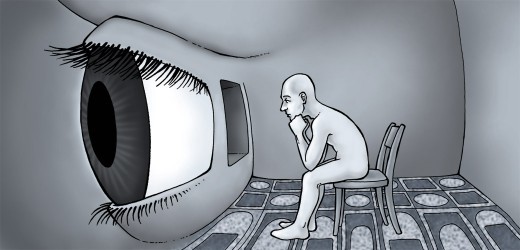
Depersonalization problems
Due to the riots in the city, there are a lot of people who experience feeling detached from their mental processes or body, as if they are an external observer of the phenomena occurring with them. This can occur in states of severe emotional trauma also. It is called as depersonalization disorder. It can also occur in migrants or in students who go abroad for studies and find themselves in a new land for the first time. One finds it hard to keep a fast hold on one’s habitual views of life or in one’s faith in the invisible – on the sense that the past joys and sorrows are a real experience, when transported to a new land, where the beings around them know nothing of their history, and share none of their ideas – where the mother earth shows another lap, and human life has other forms than those on which their souls have been nourished. Minds that have been unhinged from their old faith and love have perhaps sought this influence of exile, in which the past becomes dreamy because its symbols have all vanished, and the present too is dreamy because it is linked to no memories. One would feel completely impersonal. The world is seen like a photograph and one feels outside of one’s life. In the ordinary circumstances of life, one receives the sensory impressions of objects, marshals his memories, recalls images, forms and combines ideas, judges, reasons, carries out actions, is affected by pleasure and pain; is aware of all of these and of their connections with himself. In depersonalization, there is a cessation of an awareness of these experiences as his own; he will witness his life as a performance presented by another; he will continue to perceive sensations, colors and forms, touches, smells but it will seem to him that these sensory impressions do not affect him any more. He will continue to have memories, but it will appear to him that the past they recall escapes him and is no longer his own. He will still think, reason, act, even be moved by feelings, but it will seem to him that it is not he who thinks, reasons, acts, or feels pleasure or pain. Although nothing in hi life will different, yet everything about it will appear changed. He will no longer know himself, will be amazed that he is still alive, and will be outside of his experiences. There is a quality of unreality and estrangement that colors conscious experience. All one’s personal mental operations and behavior may feel alien. There is a loss of capacity to experience emotions, even though they are expressed. Things do not look the way they used to. Everything that one sees, even the decorations on the wall of the room, seem strange. It is as if one is seeing everything for the first time. Everything appears unreal and odd. It is as if reality were deformed. This is accompanied by considerable anxiety and one may feel afraid that one is going insane. Even though one may complain of being emotionally dead, one may become greatly upset by the sense of deadness. These manifestations are often highly unpleasant; they may motivate one to vigorous activity or self-stimulation in form of self-injury. The sensation of being in a dream is the most painful part. One often speaks in a loud voice in order to restore the reality of the external world and one’s own identity, but then the illusions become even more marked. The sound of the voice is absolutely insupportable and does nothing to restore impressions to normal. However, one retains a keen self-awareness of one’s incapacitation. This is not madness. Madness means the impossibility of recovering one’s normal balance after the mind has thus played truant among alien forms of being, and followed invisible worlds. Madness means the incapacity for self-judgment and self-control. Here there is strangeness outside one’s individuality but the self-awareness remains intact. What is lost is the subtle sense of reality and meaning. There is a change in the quality of one’s perception of events. The emphasis is the importance of the traumatic events and their painful memories, which are being put away by the numbing of sensations. Due to the trauma, there is a loss of the basic mental energy that enables healthy people to combine various mental functions (sensations, memories, volitions) into a stable, unified psychological structure under conscious domination and control of the personal self. This quantum of energy is lowered below a critical point, the binding power of the personal self is seriously impaired and the various psychological functions escape from its control leading to the depersonalized state. The worst part is that these problems are known to be notoriously refractory to improvement. Mediations seem to have almost no role in this problem and their effectiveness is questioned. Psychotherapeutic interventions also have little or no role in the severity of the problem. The cathartic discharge of emotions associated with the trauma may provide relief. Some may obtain a degree of relief from the anxiety by knowing that they are not alone in their suffering or in danger of going insane. Supportive relationships by family and friends may moderate their distress. It is mandatory for these people to have a stable environment in which they can understand the nature of their problem and its inevitability also. Mild forms may run an attenuated course while major depersonalization may require more intensive supportive systems.



